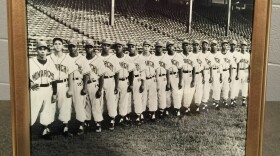Ray Doswell graduated from Monmouth College in 1991 before working on his master's degree at the University of California, Riverside. As Doswell completed his graduate studies he wrote to the Negro Leagues Baseball Museum in Kansas City, Missouri, telling them he needed a job.
"(They said) we may need you as well. So as I finished my work at the university, I got an interview to be the curator here at the museum, and I’ve been here ever since. That was the summer of 1995," Doswell said.
He is now vice president of curatorial services. He said his primary job is to take care of exhibits and collections at the museum.
"We have a good size photographic collection and a number of artifacts related to African American baseball history from the 1800s through the 1960s, emphasizing what we call the professional Negro Leagues, which was 1920 to 1960," he said. "There is a lot of photography out there related to Black baseball and the integration of baseball."
Doswell also helps manage educational programs. He speaks to schools, colleges, and the general public. This month he delivered the presentation "Black Baseball & Black History" via Zoom as part of the Tartan Talk series at Monmouth College.
In addition, he assists researchers, journalists, and filmmakers seeking information about the history of Blacks in baseball.
The museum is currently open, though with truncated hours.
A Bit of the History
In mid-December, Major League Baseball (MLB) announced it will recognize the Negro Leagues as major leagues. That means Negro League records and statistics are being added to MLB’s official history.

Blacks were barred from the Major Leagues for many decades by a so-called “gentlemen’s agreement” among team owners. Doswell said the Negro National League was the first successful Negro league. Organizers formed it at a meeting in Kansas City on February 13, 1920.
Doswell said even after Jackie Robinson broke the MLB color barrier in 1947, many teams were slow to add Black players. He said some teams imposed quota systems on their number of Black players, and he cited the New York Yankees as an example of a team that felt it could benefit financially from continued segregation.
“The Yankees owned Yankee Stadium. And even though there wasn’t always a regular Black team playing at Yankee Stadium, they often rented that stadium to the Negro leagues for exhibitions - four team doubleheaders, which were very well attended in the Black community,” Doswell said.
“The Yankees owned the Newark Bears and Newark Stadium, which they rented to the Black team, the Newark Eagles. The Yankees owned Blues Stadium here in Kansas City, which was their minor league team, the Kansas City Blues, and they rented that stadium to the Kansas City Monarchs.
“The Yankees were not in a hurry to lose that revenue.”
Doswell said a few Negro League teams owned their own ballparks but most rented from major and minor league teams.
Doswell said he hopes museum visitors come away realizing the Negro Leagues were a bigger story than they thought.
“It’s a broad history. It’s steeped in African American history, especially the story of the great migration,” he said. “They embraced the great American game and staked their claim to citizenship in many ways.
“Maybe you thought you would learn about great home run hitters or someone stealing a lot of bases or stats like that. But no, what you really learned about were people and what they had to do to overcome racism, segregation, and oppression.”
He said Negro League baseball players helped paved the way for integration in America, opened eyes to the evils of segregation, and showed what it could be like if everyone was given a fair opportunity.
This story was produced by Tri States Public Radio. TSPR relies on financial support from our readers and listeners in order to provide coverage of the issues that matter to west central Illinois, southeast Iowa, and northeast Missouri. As someone who values the content created by TSPR's news department please consider making a financial contribution.




